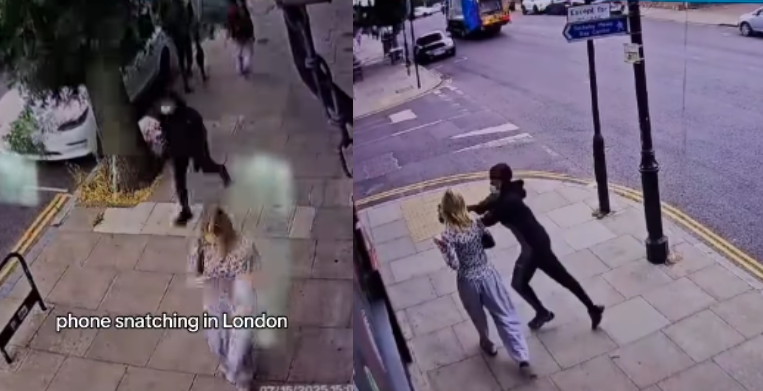
When Emma Van Der Hoek felt someone brush past her on a busy London street, she didn’t think much of it.
Seconds later, her phone was gone—and her life would take an unexpected turn.
What started as a simple theft soon turned into a viral moment that captured global attention and reignited debate over London’s phone crime epidemic.
From an ordinary stroll to an extraordinary stand
The Sydney-born expat had no idea she was being filmed when a thief snatched her mobile from her hands and vanished into the crowd.
But her CCTV footage—showing her running after the perpetrator—spread rapidly across social media, amassing more than six million views and turning her into an unlikely symbol of defiance.
‘In a way, I hope it's made more people aware and made more people stand up for themselves and stand up to phone thieves, because it's just become so normalised here,’ she said.
Her video went viral at a critical moment, as official figures revealed phone thefts in London hit 117,211 in 2024, up from 115,261 the previous year.
The city had earned the unwanted title of the world’s ‘phone theft capital.’
'This is the largest crackdown on mobile phone theft and robbery in the UK in the most extraordinary set of operations of this kind that the Met has ever undertaken.'
A turning point in the crackdown
Van Der Hoek’s viral story coincided with a major turning point in law enforcement.
In October 2025, London police dismantled a sophisticated criminal network accused of smuggling nearly 40,000 stolen phones from the UK to China—believed to be responsible for 40 per cent of all phone thefts in the capital.
The operation traced back to December 2024, when customs officers at Heathrow Airport seized around 1,000 iPhones bound for Hong Kong in an ‘unusual’ shipment.
By February 2025, coordinated raids led to 1,000 phones being recovered and 230 arrests made in a single week.
The results were immediate—phone theft and robbery fell by 13 per cent across London in the first quarter of 2025.
Why Australians are high-risk targets
The threat has become all too real for the 743,000 Australians who visited the UK in the year to July 2024.
Three-quarters of England and Wales’ 78,000 phone thefts by March 2024 took place in London, with hotspots like Westminster and central London recording the highest rates.
Westminster alone saw a staggering 71 per cent increase in reported cases—precisely where Australian tourists flock to landmarks such as Big Ben and Westminster Abbey.
Detective Chief Inspector Kevin Ives explained the risks: ‘Also, people's lives are on their phones, and the way these phones are stolen is that the thieves get access to banking details and other sensitive information. If someone steals a phone from someone's hand, then usually all the apps are open.’
Government data revealed that around £7,000 was defrauded from victims each day after such thefts, as criminals exploited access to banking, cryptocurrency and credit apps.
The hidden economy of stolen phones
Behind the street-level thefts lies a lucrative global trade.
Police reports show that local thieves earn between £200 and £300 per handset—roughly $400 to $600 AUD—while high-end iPhone 16 Pro Max models can fetch up to £5,000 overseas.
The crime is swift and calculated, often involving e-bike or scooter riders who snatch devices from pedestrians before slipping them into foil-lined ‘faraday bags’ to block tracking signals.
Police operations showing results
- 30% reduction in City of London phone thefts in early 2025 (213 vs 294 in same 2024 period)
- Major international smuggling network disrupted in October 2025—1,000 phones seized and 230 arrests in one week of February 2025 action
- 13% drop in theft and robbery across London in Q1 2025
The government steps in
In February 2025, the Home Secretary convened a mobile phone theft summit with the National Crime Agency, police chiefs, tech companies and the Mayor of London.
Their shared goal was to ‘break the business model of mobile thieves’ and render stolen devices ‘effectively worthless to criminals.’
New legislation, the Crime and Policing Bill 2024–25, passed its House of Commons report stage in June, granting police expanded powers to recover stolen devices without a warrant.
Operation Swipe: new tactics, real results
Among the most promising efforts is Operation Swipe, launched by the City of London Police in January 2025.
It increases police visibility in high-risk areas with enhanced CCTV and proactive patrols to ‘deter, detect, apprehend and prevent phone snatching.’
Since the operation began, reported phone thefts in the City of London have dropped from 294 in early 2024 to 213 in the same period of 2025—a 30 per cent decline.
Staying safe with your phone in London
Keep phones concealed when not essential to use them
Use headphones for calls instead of holding your phone
Stay alert in touristy areas like Westminster, Central London
Avoid using phones while walking near road edges
Be particularly cautious around people on e-bikes or mopeds
Consider a phone chain or lanyard when travelling
Set up remote wipe capabilities before travelling
Ensure banking apps require additional authentication
Tech companies join the fight
Mayor Sadiq Khan has urged mobile manufacturers to make stolen devices less attractive to thieves, commending Google for its latest anti-theft updates.
The industry is responding with stronger remote-locking systems, enhanced tracking tools and tougher reset restrictions—making stolen phones increasingly difficult to profit from.
The emotional aftermath
Despite the progress, the personal toll remains.
Van Der Hoek admitted that while she still enjoys life in London, the incident has changed her outlook.
‘Phones are replaceable, but what happened to me, them creeping up behind me and then just snatching it from me was quite scary, and I will probably think about it for a while,’ she said.
Her story mirrors that of countless Australian tourists caught off guard by how ‘normalised’ phone crime has become in London.
Looking forward
Commander Owain Richards, who leads the Metropolitan Police’s phone theft initiative, acknowledged the scale of the challenge.
‘It's an invasive and sometimes violent crime and we're committed to protecting Londoners and tackling this issue. We continue to use data and technology to build intelligence and track stolen items,’ he said.
While Van Der Hoek never got her phone back, her story sparked awareness that could save others from the same fate.
Her courage proved that even a single act of defiance can ripple across continents—and remind travellers everywhere to stay alert, stay prepared, and never underestimate the power of speaking out.
What This Means For You
London recorded more than 117,000 phone thefts in 2024, prompting an unprecedented police response throughout 2025. Australian travellers have been among the hardest hit, particularly in central London’s tourist-heavy areas where thefts remain most common.
Thankfully, new UK laws and targeted police operations such as Operation Swipe are now helping to curb the problem and recover more stolen devices.
At the same time, major tech companies are stepping up with stronger anti-theft features designed to make stolen phones useless to criminals. For travellers planning a visit, these changes mean greater protection—but also a timely reminder to stay alert, safeguard your devices, and never underestimate the value of a few simple precautions.
While phone thefts in London have made headlines, they’re not the only threat facing travellers abroad.
Across Europe, a new wave of scams is catching people off guard—often when they least expect it.
If you want to stay one step ahead of these cunning tricks, here’s another story worth reading.
Read more: Discover the new scam targeting travellers in Europe—are you too kind to notice?
London phone theft capital: Australian fights back — ABC News Australia report detailing Emma Van Der Hoek’s viral experience after her phone was stolen in London, highlighting rising theft rates and the UK’s crackdown.
https://www.abc.net.au/news/2025-10-10/london-phone-theft-capital-australian-fights-back/105864288
City of London Police tactics preventing phone theft | City of London Police — Outlines proactive strategies including Operation Swipe and updated police powers under the Crime and Policing Bill.
https://www.cityoflondon.police.uk/...london-police-tactics-preventing-phone-theft/
Thefts of mobile phone from January 2019 to March 2025 | Metropolitan Police — Official figures showing phone theft trends from 2019 to 2025, peaking at 117,211 in 2024.
https://www.met.police.uk/foi-ai/me...25/thefts-mobile-phone-january2019-march2025/
UK police dismantle phone-theft network accused of smuggling 40,000 phones to China — ABC News — Details a major investigation that disrupted a smuggling ring responsible for 40% of London’s phone thefts.
https://abcnews.go.com/Internationa...-network-accused-smuggling/story?id=126285417
Mobile phone thefts — House of Commons Library — Explains government action against phone thefts, including the 2025 summit and new police powers under the Crime and Policing Bill.
https://commonslibrary.parliament.uk/research-briefings/cdp-2025-0150/
London faces a crisis as stats of phone thefts increase rapidly — SWLondoner — Examines London’s surge in mobile thefts, highlighting hotspot areas and comments from officials including Mayor Sadiq Khan.
https://www.swlondoner.co.uk/news/2...sis-as-stats-of-phone-thefts-increase-rapidly
Have you ever experienced phone theft while travelling overseas—and what safety habits do you follow to protect yourself?







